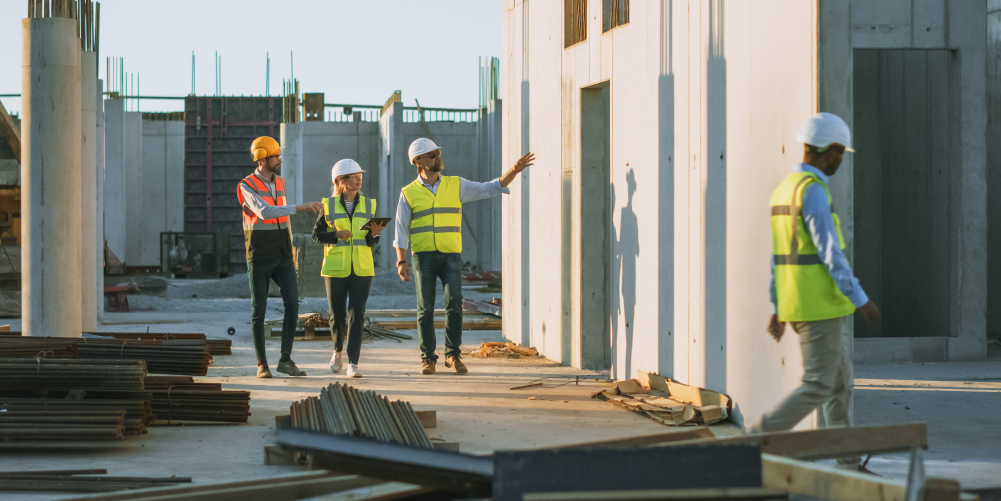— 7 min read
Construction Warranty Types: What Are Contractors Responsible for — and for How Long?
Last Updated Nov 16, 2023

A warranty is any representation made by one party that another can and will rely on. Simply put, it’s a promise that something will be done a certain way. There are several types of construction warranty that contractors need to be aware of — both during the construction phase and after.
Contents
Table of contents
Types of construction warranties
Explicit versus implied warranties: What’s the difference?
An explicit warranty is clearly written in a contract or proposal. Since many contractors use their proposals as the basis of their contracts, proposal warranties are just as important as those in a contract. Explicit warranties are legally viable and will be upheld in court.
A well-drafted warranty should be fully comprehensive. It should describe the specific problems and remedies that the party may be responsible for, the way the issue will be dealt with, and the length of time the warranty will be in effect.
Implied warranties are provided by the law, whether they are written in the contract or not. These types of warranties can occur in construction projects whether there’s a written contract or not.
Types of explicit warranties
There are many types of explicit warranties in construction. Four main types are material and equipment, call back, vendor, and design-build.
A material or equipment warranty states that the item being warrantied will be properly constructed, is functional, and is in accordance with the design intent of the project.
Callback warranties are the standard warranties most of us think about when it comes to construction. During the callback warranty period, the owner can call the contractor to take care of any work that wasn’t performed correctly during the project. The owner must notify the contractor to give them a chance to repair or replace the work before pursuing other remedies to fix the issue, like hiring a different contractor.
Vendor warranties are issued directly from the manufacturer or seller of a product. These warranties aren’t part of the contract and are often limited in scope and coverage. Roofing and appliance warranties are examples of vendor warranties.
A design-build warranty covers professional services, like architecture or engineering, and helps ensure that the design professionals are meeting the standard of care. This type of warranty has more to do with the performance of the designers and contractors than particular materials or products.
Types of implied warranties
There are two main implied warranties that contractors need to be aware of: workmanship and habitability.
The workmanship warranty says that the work will be built in a good or workmanlike manner, free of major defects. This type of warranty applies to both labor and materials. Sometimes a workmanship warranty is explicitly included in a contract.
The warranty of habitability states that buildings will be suitable for the purpose they are intended for and be safe to live in. This warranty generally only applies to new residential construction projects. It guarantees that the building will be safe and meet code requirements.
How long do construction warranties last?
Most explicit warranties have a time limit that will be stated in the contract or on the warranty document. For example, a standard roofing warranty will last around 20 years from installation. Problems incurred after the warranty period has expired are not covered.
When it comes to implicit warranties, like workmanship and habitability, you have to look to the law to find out how long these warranties last. There are two statutes that are important when determining the length of an implied warranty: the statute of limitations and the statute of repose.
The statute of limitations sets a limit for how long a person has to file a claim based on when the harm occurred. The standard is roughly 3–10 years from the discovery of the problem or damage.
So, if a roof leak caused by poor workmanship is discovered five years after the roof is installed, the owner has an additional 3–10 years from that date to file a claim, depending on the relevant laws. Even if the roof leak was discovered 10 years after installation, the owner still has 3–10 years to file a claim. The limit of this warranty is set by statute, so state timelines vary.
The statute of repose sets a deadline to file a claim based on a specific event plus the passage of time. Typically, it is 6–12 years from the date of substantial completion. In this case, if a roof leak is discovered 10 years after installation, if the statute of repose is eight years, the claim may be denied due to the statute of repose expiring.
Most contractors are familiar with the “one-year warranty,” assuming that they are not liable for workmanship defects after one year. This common understanding likely comes from the language in the AIA A201 General Conditions, which states:
“if, within one year after the date of Substantial Completion of the Work or designated portion thereof … any of the Work is found to be not in accordance with the requirements of the Contract Documents, the Contractor shall correct it promptly after receipt of notice from the Owner to do so. … During the one-year period for correction of Work, if the Owner fails to notify the Contractor and give the Contractor an opportunity to make the correction, the Owner waives the rights to require correction by the Contractor and to make a claim for breach of warranty.”
However, this provision of the AIA contract really only operates as a call back warranty, giving the contractor an opportunity to fix a defect within the first year after completing the project.
Learn more about general conditions – General Conditions in Construction: A Contractor’s Guide
Disclaiming a warranty in the contract
Since implied warranties exist whether or not they are in the contract, it can be difficult to disclaim or nullify them. However, some states allow this by adding specific language stating that an implied warranty is not being offered. Even still, it’s important to include specific language disclaiming the implied warranty, as courts tend to favor the consumer in these cases.
Explicit warranties, since they are created by the contract language, can be negotiated out during the contract review process. As long as both parties agree to the terms, it’s a fair agreement.
Breach of warranty? How damages are calculated
A breach of warranty is a simple concept — it’s when an applicable warranty is breached. Such a breach can occur when a contractor fails to fix or repair any damage that is covered by a warranty, or when the owner can show that the contractor used substandard material or installation methods. When a breach occurs, damages can be calculated in different ways, commonly when the cost to repair or replace the work or diminution in value.
The cost to repair or replace the work is a clear measure of the value of the breach of warranty. The owner is able to recover this value from the contractor, or the contractor can complete the work at no charge. However, if the contractor can prove that repairing or replacing the products would create excessive damage to the structure or be a waste of money, the value of the breach may be calculated using diminution in value. This is the difference between the value of the actual project and the value that the project would have had if it’d been built as specified and warranted.
Courts have, in limited circumstances, awarded a combination of the above when damages were repaired and there still remained a diminution in the value of the property.
Research construction warranty laws for your state
Construction warranties can be explicit, written in the contract, or implied, determined by state statute. Contractors need to be particularly aware of those warranties implied in state law. Even for explicit warranties, it’s important to understand how courts treat them in your state. So, before starting work in a new state, it’d be wise to talk to trade groups or discuss warranties with a legal professional.
Categories:
Tags:
Written by
Dawn Killough
33 articles
Dawn Killough is a writer with over 20 years of experience in construction, having worked as a staff accountant, green building advisor, project assistant, and contract administrator. She shares fundamental green building strategies and techniques in her book, Green Building Design 101. Dawn lives in Portland, Oregon.
View profileReviewed by
Matt Viator
Matt Viator, Counsel for Procore Technologies, a Louisiana native who's settled in New Orleans after a brief stop in Baton Rouge. Matt joined the Levelset (a Procore Company) team as a 2016 and is a licensed Louisiana attorney with a J.D. from Tulane University Law School. Matt has extensive construction law knowledge surrounding contracts, payments, and more.
View profileExplore more helpful resources

Contract Precedence: A Clause to Clear Construction Confusion
Construction contracts are usually lengthy and complicated, composed of a wide range of documents In a perfect world, the contract provides the clarity and direction all stakeholders need to move...

Construction Contract Administration: Roles & Responsibilities
Construction contracts, especially for large projects, can be extremely detailed with many key documents often compiling thousands of pages. Because of this, larger firms have a dedicated role to keep...

Construction Contract Documents: 9 Key Components
Every construction project — whether a small-scale residential renovation or an extensive municipal development — requires a contract. Construction contracts are multifaceted, often comprising numerous documents that cumulatively define the...

Job Order Contracting (JOC) Explained
Contracts for commercial construction projects usually cover a complete scope of work, but large institutions often have ongoing needs for smaller projects. This is where job order contracting (JOC) comes...
